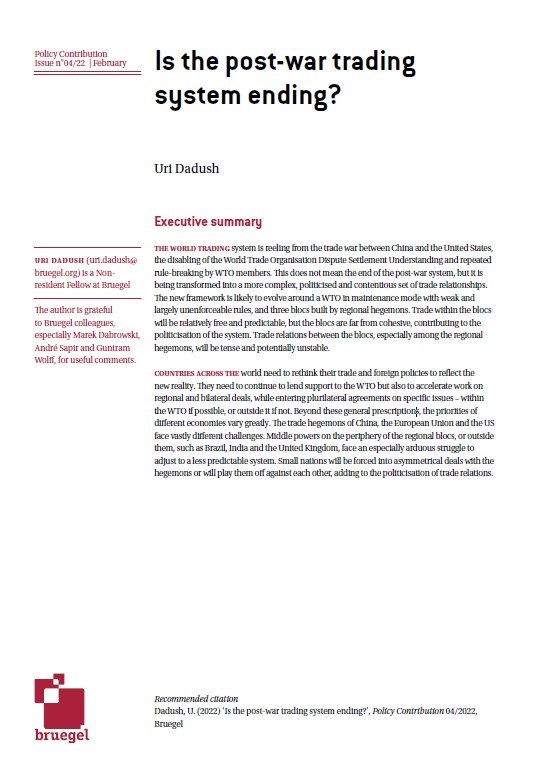Blog Post
The United States-Mexico-Canada free trade agreement (USMCA)
While final ratification of the USMCA (also known as Nafta 2.0) is pending, we review economists’ assessment of the agreement.
If you are unfamiliar with the deal, Chad P. Brown highlights five surprising things about USMCA and Geoffrey Gertz has a five-things-to-know compendium.
The Economist’s leader argues that the renegotiation of Nafta is a relief but not a success. Although the new pact does contain improvements to Nafta, taken as a whole it is a step backwards for free trade. As a result, it will harm America.
Trade deals should not be judged by how well they protect domestic industries, but by whether they serve the public as a whole. Against this yardstick, the USMCA is clearly worse than the deal it is replacing. A marginal liberalisation of the Canadian dairy industry is welcome but is not worth higher costs and lower productivity in carmaking. Free traders might take solace from the fact that, to seal the USMCA, America has proved willing to compromise, but this – according to the Economist – raises hopes that President Trump will pull off a deal in his trade war with China.
Tyler Cowen writes that renaming Nafta just might work. While the renegotiation of Nafta is decidedly underwhelming, its renaming as USMCA could prove to be a stroke of political and marketing genius. Names really matter, and politicians should give as much thought to them as corporations do.
Perhaps being so easy to say and remember has been part of Nafta’s problem. The sad reality is that voters do not love the idea of free trade once it is made concrete to them, and both Barack Obama and Trump campaigned against Nafta in its current form. So maybe every time people heard the name Nafta, they were reminded of how much they disliked it. There is yet another advantage to the new name: many politicians, especially Democrats, are on record as opposing Nafta. The change of name gives them a chance to rebrand their opinions, even if they do not wish to do so right now when Trump is touting his victory.
Jeffrey J. Schott writes that for Canada, Mexico and the United States, the USMCA is a step backwards on trade and investment. Nafta’s benefits had always been primarily through the strengthening of economic integration of the three economies; the new pact moves backwards in this critical regard and imposes new restrictions that will impede regional trade and investment, stifling the potential for economic growth. On autos, this is the first free trade agreement negotiated by the United States that raises rather than lowers barriers to trade and investment. The new content rules and minimum wage requirements will likely lead to a less competitive North American auto industry with less investment in US plants and fewer US jobs.
The implications of the deal for other sectors are mixed and not very significant. The USMCA does remove some distortions in Canadian pricing schemes for dairy products, which should result in larger US dairy exports to Canada than those expected from Trans-Pacific Partnership (TPP) reforms. However, the amount of total reduction in barriers is very small. US dairy export gains pale in comparison to the losses that continue to be borne by US farmers due to barriers raised against US farm products by Canada and Mexico (and many others) in response to the Trump administration’s aluminum and steel tariffs.
Jared Bernstein writes that while there are differences with respect to the original Nafta, they are not big enough for Trump to credibly claim that Nafta was a horrible disaster while the USMCA is incredible. Bernstein does not see the deal, should it become law, changing the flows of goods, services, money, or people in ways that would change economic outcomes. Bernstein thinks that some of the auto requirements – intended to reduce the trade-induced wage arbitrage opportunities that have long hurt production workers exposed to export competition – and the new rules on Mexican unions are a positive change. What’s bad in the new deal, according to Bernstein, is the same as what was bad in the old one (same with TPP): protectionist measures that further belie the idea of “free trade”, particularly patent and IP extensions that American lobbies like Big Pharma insist on as the price of their support.
Fred Bergsten writes that one positive aspect in USMCA is that it is the first trade agreement in history to directly address an issue that has aroused opposition to such agreements in the past – currency manipulation by trading partners. Currency manipulation became a central issue for trade policy during 2003-13, when about 20 countries intervened heavily in the foreign exchange markets, averaging more than $600 billion per year. By keeping their currencies undervalued, they made their exports less expensive and imports more expensive, thereby strengthening their international competitive positions and building their trade surpluses.
Manipulation was carried out by manufacturing countries, mainly in Asia; oil exporters; and financial centers, especially Switzerland and Singapore. The currency chapter in the USMCA is unlikely to affect Mexico or Canada, as neither has been a currency manipulator and both run global current account deficits in any event. But it could become an important template for later deals with other countries.
Daniel J. Ikenson writes that USMCA is the best trade agreement ever negotiated (except for all of the others). The ideal free trade agreement is one which accomplishes maximum market barrier reduction, enables maximum market integration, forecloses governments’ access to discriminatory protectionism, and obligates the parties to refrain from backsliding. By 10 standards identified as essential to an ideal free trade agreement, USMCA falls way short – with four criteria “met” or “almost met”, and six criteria “unmet” or “worse than unmet”. On a more realistic comparison – i.e. relative to the TPP – Ikenson thinks that the USMCA is a disaster because it entails more protectionist provisions than TPP.
Gary Clyde Hufbauer and Euijin Jung write that a positive in USMCA is the introduction of higher de minimis thresholds, which determine which low-value parcels can be shipped across international borders tax-free, tariff-free, and with simple customs forms. In 1992, when the original Nafta was negotiated, online shopping was not a relevant issue and low-value parcels were a minor feature of international commerce. No one gave much thought to de minimis thresholds: in most countries the thresholds were low and for anything above that threshold amount, a tariff was applied. Much has changed since 1992, but most especially a surge in online shopping and parcel deliveries.
In March 2016, the United States raised its de minimis threshold from US$200 to US$800, but Mexico kept its threshold at US$50, and Canada at C$20. In the USMCA Chapter 7, Mexico agreed to a US$50 de minimis tax-free threshold, and a US$117 threshold for tariff-free and simple customs forms. Canada agreed to a C$40 (US$31) tax-free threshold, and a C$150 (US$117) threshold for tariff-free and simple customs forms. These improvements will encourage online shopping, benefiting not only US sellers but also Mexican and Canadian buyers.
Clay R. Fuller argues that there is a genuine bright spot buried in the USMCA’s more than 1,800 pages: North America has now officially entered a new era of international anti-corruption compliance, coordination, and cooperation. Auto manufacturing and dairy markets will quickly adjust to the treaty’s new provisions. A unified, continental front against corruption will have long-run positive effects for years to come. Chapter 27 of the USMCA outlines a general framework for international cooperation on anti-corruption efforts under several existing agreements; Nafta contained no such commitments. The USMCA’s anti-corruption language highlights the importance of international cooperation in combating corruption.
Republishing and referencing
Bruegel considers itself a public good and takes no institutional standpoint. Anyone is free to republish and/or quote this post without prior consent. Please provide a full reference, clearly stating Bruegel and the relevant author as the source, and include a prominent hyperlink to the original post.









